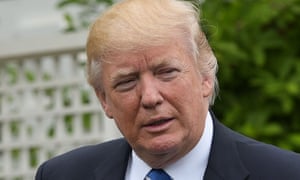Donald Trump
expressed confusion in an interview published on Monday as to why the
civil war had taken place. He also claimed that President Andrew
Jackson, who died 16 years before the war started, “was really angry”
about the conflict.
Trump also said Jackson, a slaveholder and war hero who led a relocation and extermination campaign against Native Americans, “had a big heart”.
The president made his remarks in an interview with the Washington Examiner to mark his 100th day in office, which fell on Saturday. “It’s a very intensive process,” Trump told his interviewer of the presidency. “Really intense. I get up to bed late and I get up early.”
His remarks about Jackson and the civil war appeared to arise from a discussion of a painting of the seventh president that Trump moved into the Oval Office after his inauguration. Trump has called Jackson “an amazing figure in American history – very unique so many ways” and said that he identifies with his populist forebear.
In March he visited the Hermitage, Jackson’s home in Nashville, Tennessee, which was partly built by slaves, and was pictured saluting at the former president’s grave.
“I mean, had Andrew Jackson been a little later, you wouldn’t have
had the civil war,” Trump told the Examiner’s Salena Zito. “He was a
very tough person, but he had a big heart.
“He was really angry that he saw what was happening with regard to the civil war. He said, ‘There’s no reason for this.’ People don’t realize, you know, the civil war – if you think about it, why? People don’t ask that question, but why was there a civil war? Why could that one not have been worked out?”
The civil war was fought over slavery – the enslavement in the United States of African Americans – and related territorial, economic and cultural struggles. Jackson died in 1845. The first shot was fired by forces of the secessionist, slaveholding states on Fort Sumter in Charleston, South Carolina, on 12 April 1861.
Defenders of Trump’s creative approach to history argued on Monday that the president was referring to a successful effort by Jackson in the 1830s to put down a secessionist threat. Nothing in Trump’s statement, however, indicates knowledge of the earlier episode, which was not part of the civil war.
Trump’s statements drew expressions of extreme disbelief and consternation online. Many scholars noted that the investigation of the civil war’s roots was one of the richest veins in all of US historiography.
“Footnote for non-US readers,” tweeted the Guardian contributor Sarah Churchwell, a professor of American literature at the University of London. “There are probably as many books about the origins of our Civil War as about the origins of world war II.”
Trump also said Jackson, a slaveholder and war hero who led a relocation and extermination campaign against Native Americans, “had a big heart”.
The president made his remarks in an interview with the Washington Examiner to mark his 100th day in office, which fell on Saturday. “It’s a very intensive process,” Trump told his interviewer of the presidency. “Really intense. I get up to bed late and I get up early.”
His remarks about Jackson and the civil war appeared to arise from a discussion of a painting of the seventh president that Trump moved into the Oval Office after his inauguration. Trump has called Jackson “an amazing figure in American history – very unique so many ways” and said that he identifies with his populist forebear.
In March he visited the Hermitage, Jackson’s home in Nashville, Tennessee, which was partly built by slaves, and was pictured saluting at the former president’s grave.
“He was really angry that he saw what was happening with regard to the civil war. He said, ‘There’s no reason for this.’ People don’t realize, you know, the civil war – if you think about it, why? People don’t ask that question, but why was there a civil war? Why could that one not have been worked out?”
The civil war was fought over slavery – the enslavement in the United States of African Americans – and related territorial, economic and cultural struggles. Jackson died in 1845. The first shot was fired by forces of the secessionist, slaveholding states on Fort Sumter in Charleston, South Carolina, on 12 April 1861.
Defenders of Trump’s creative approach to history argued on Monday that the president was referring to a successful effort by Jackson in the 1830s to put down a secessionist threat. Nothing in Trump’s statement, however, indicates knowledge of the earlier episode, which was not part of the civil war.
Trump’s statements drew expressions of extreme disbelief and consternation online. Many scholars noted that the investigation of the civil war’s roots was one of the richest veins in all of US historiography.
“Footnote for non-US readers,” tweeted the Guardian contributor Sarah Churchwell, a professor of American literature at the University of London. “There are probably as many books about the origins of our Civil War as about the origins of world war II.”

No comments:
Post a Comment